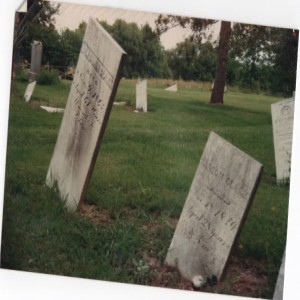
Saturday Aug 20, 2022
SW0122 At Foundation’s Archive, Grad Students from UCF Discover Dead Men Do Indeed Tell Tales

State of the gravesite of Ransom Clark and (left) his father, Benjamin Clark in 1977 before the exhumation.
The trope that dead men tell no tales is demonstrably false -- at least, when applied to a document archive. Letters, diaries, and hand-written notes tell many tales.
This summer, two graduate students from the University of Central Florida learned this first hand when they paid a visit to the Frank Laumer Center for Seminole Wars Studies, at the Seminole Wars Foundation in Bushnell, Florida.
The Public History interns learned one big tale here -- and a series of smaller ones -- from a long-dead soldier from the Second Seminole War and his more recently deceased muse. The soldier was Private Ransom Clark, one of only three soldier survivors of the Dade Battle of December 28, 1835. His muse was Frank Laumer, a land developer with a sideline as Seminole Wars historian and a dedicated chronicler of Clark's life and military service.
In his dogged research to tell Clark's story, the late Frank Laumer followed the trail wherever it took him. That led him to a cemetery in upstate New York and permission from Clark's descendants to see if he could verify the wounds that Clark said he sustained in the battle.
How did Frank Laumer go about this? Well, he is no longer with us but his copious correspondence tell his tale for what he was looking for and why.
In this episode, Lisa LaPenna and Olivia Aldrich, the two UCF Public History grad students, join us to discuss the revelations they found in the Foundation's archives about the exhumation of Ransom Clark. They tell what they learned about the Seminole Wars via Clark's story, and how they went about examining this scholarly first-hand source.


Frank Laumer helped with the exhumation.


Forensic Pathologist Amir A. Djavaheri exhumed and examined Clark's remains.

Skull of Ransom Clark. (below) One of dozens of photographic slide images of the process.





The late Frank Laumer wrote a novel about Ransom Clark, Nobody's Hero (and an unpublished sequel, Somebody's Hero). He petitioned the Veterans Administration to install a new military-standard headstone for Ransom Clark's grave. He also purchased the legacy headstone from Clark's descendants and donated it for display at the Tampa Bay History Center to help tell the tale of a Seminole War Survivor. At his request, Laumer, who died on the same day as Clark, November 18, requested his ashes be scattered on Clark's grave. His request was granted one year to the day after his 2019 death.


Olivia Aldrich and Lisa Lapenna, two public historian grad students from University of Central Florida in Orlando set out to catalog the paper archives of the Seminole Wars Foundation collection, in Bushnell. The archives consist of the research files of the late Frank Laumer, who dedicated more than half of his life to raising awareness of the Seminole Wars. They briefed their UCF Public History assessment panel via Zoom call in this screen capture.

Host Patrick Swan is a board member with the Seminole Wars Foundation. He is a combat veteran and of the U.S. Army, serving in Iraq, Afghanistan, Kuwait, and Kosovo, and at the Pentagon after 9/11. A military historian, he holds masters degrees in Public History, Communication, and Homeland Security, and is a graduate of the US Army War College with an advanced degree in strategic studies. This podcast is recorded at the homestead of the Seminole Wars Foundation in Bushnell, Florida.
Subscribe automatically to the Seminole Wars through your favorite podcast catcher, such as iHeart or Stitcher or Spotify, DoubleTwist, or Pandora or Google podcasts or iTunes, or ... Check it out so you always get the latest episode without delay where and when you want it. Like us on Facebook, LinkedIn, and YouTube!
No comments yet. Be the first to say something!